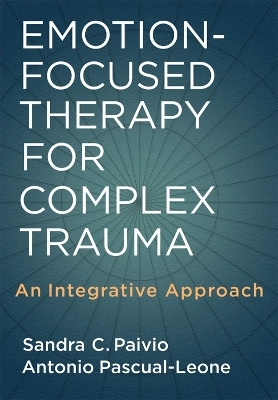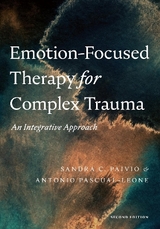
Emotion-Focused Therapy for Complex Trauma
American Psychological Association (Verlag)
978-1-4338-0725-1 (ISBN)
- Titel erscheint in neuer Auflage
- Artikel merken
Psychotherapy clients with histories of childhood abuse and complex relational trauma are ubiquitous, and have notoriously high drop-out rates. These clients have been unable to heal past emotional injuries and often have difficulty handling exposure-based therapies, which usually are not designed for attachment related problems. Successful therapy requires helping clients access and explore painful feelings in order to modify maladaptive emotions. Emotion-Focused Therapy for Trauma (EFTT) is the only trauma therapy that is based on an empirically-verified model that identifies steps in the process of resolving past relational issues.
In this book, the authors plumb 15 years of research involving clinical trials, observation and analysis of therapy sessions, as well as their own extensive clinical experience to describe precisely how EFTT works to heal complex trauma. The book is organized into two main sections: Part I describes the EFTT treatment model and the theory behind it, while Part II examines clients' progress through the four phases of treatment, each of which can be revisited in a recursive fashion.
The authors focus on the typical progression, beginning with cultivating the therapeutic alliance, through modifying self-concept, resolution of attachment injuries, and termination. Throughout the text, the authors make comparisons with other treatment approaches, and provide clinical examples of different kinds of emotion and emotional processing difficulties.
This book will appeal to clinicians and researchers alike and is particularly suitable for use in outpatient trauma clinics and graduate programs that emphasize service and training in empirically-supported treatments.
Sandra Paivio, PhD, CPsych, received her PhD in psychology from York University in 1993. Her program of research and clinical interests in complex trauma began at that time when she conducted and participated in published clinical trials of emotion-focused therapy. This approach proved to be particularly well-suited to clients dealing with complex trauma. Since that time, Dr. Paivio has published, with colleagues and graduate students, numerous chapters and articles on emotion-focused therapy and emotion-focused therapy for trauma (EFTT) and is the coauthor, with Les Greenberg, of Working With Emotions in Psychotherapy. Her research has continued to focus on clinical trials evaluating emotion-focused therapy and the emotional processes contributing to disturbance and recovery from complex trauma. Recent studies have evaluated the efficacy and processes of change in EFTT, and the benefits of different re-experiencing procedure. Dr. Paivio currently is a professor in and head of the psychology department at the University of Windsor, Canada, and director of the Psychotherapy Research Centre. Most recently her clinical work and supervision has focused on EFTT with refugee trauma survivors. She also maintains a part-time private practice. Antonio Pascual-Leone, PhD, CPsyc, is a clinical psychologist and a professor of psychology at the University of Windsor, Canada. Originally from Toronto, he completed his early graduate training in France and then returned to Toronto to complete his PhD with Les Greenberg at York University. Since that time, he has published a number of articles on the process and outcome of psychotherapy, with a special focus on the role of emotion. More recently, he coauthored an outcome study on an emotion-focused treatment for domestically violent men as well as several articles on psychotherapy skills training. In 2009, Dr. Pascual-Leone received the New Researcher Award from the Society for the Exploration of Psychotherapy Integration for his contribution to the field. He currently runs a research group studying emotion and intervention at the University of Windsor, where he is also a graduate faculty member teaching emotion-focused therapy and integrative approaches to psychotherapy. In addition, Dr. Pascual-Leone has been a returning faculty member at the Emotion-Focused Therapy Summer Institute (Toronto) for many years, where he helps instruct intensive seminars on emotion-focused therapy skills for professionals. As well as being involved as a therapist in several of the published clinical trials of emotion-focused therapy—for both individual and couples therapy—he has also been trained in dialectical behavior therapy and cognitive–behavioral therapy. He runs a private practice in Windsor, seeing individuals and couples.
Acknowledgments
Introduction
I. Theory
Trauma and Its Effects
Emotion-Focused Therapy for Trauma Treatment Model
Emotion
Experiencing
II. Intervention
Phase One of EFTT
Cultivating the Alliance
Promoting Experience
The Imaginal Confrontation Procedure
Phase Two of EFTT
Reducing, Fear, Anxiety, and Avoidance
Transforming Guilt, Shame, and Self-Blame
Phase Three of EFTT
Resolution Through Anger
Resolution Through Sadness and Grief
Phase Four of EFTT
Termination
Afterword
Appendix A: Short Form of the Client Experience Scale
Appendix B: Short Form of the Working Alliance Inventory
Appendix C: The Degree of Resolution Scale
References
Index
About the Authors
| Erscheint lt. Verlag | 30.1.2010 |
|---|---|
| Verlagsort | Washington DC |
| Sprache | englisch |
| Maße | 178 x 254 mm |
| Themenwelt | Medizin / Pharmazie ► Medizinische Fachgebiete ► Psychiatrie / Psychotherapie |
| ISBN-10 | 1-4338-0725-4 / 1433807254 |
| ISBN-13 | 978-1-4338-0725-1 / 9781433807251 |
| Zustand | Neuware |
| Haben Sie eine Frage zum Produkt? |
aus dem Bereich



